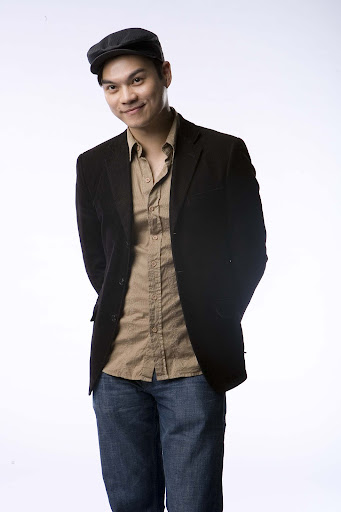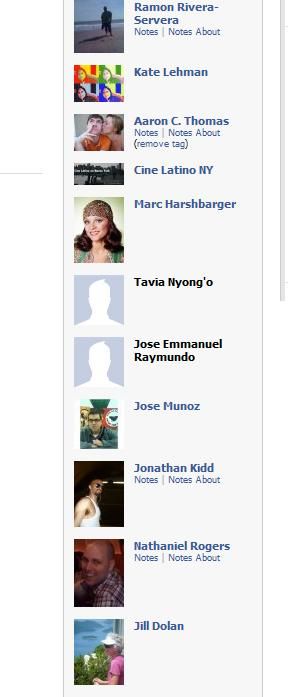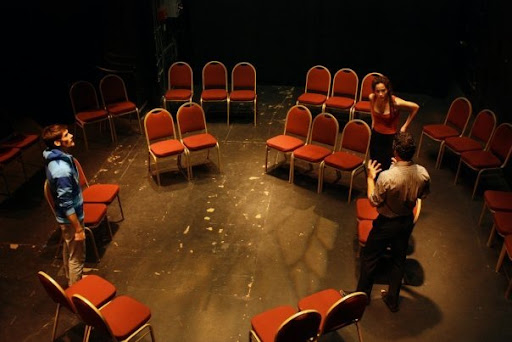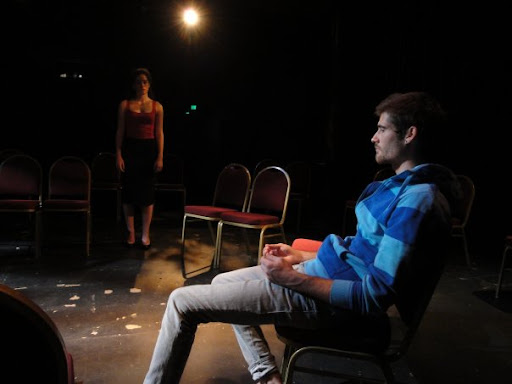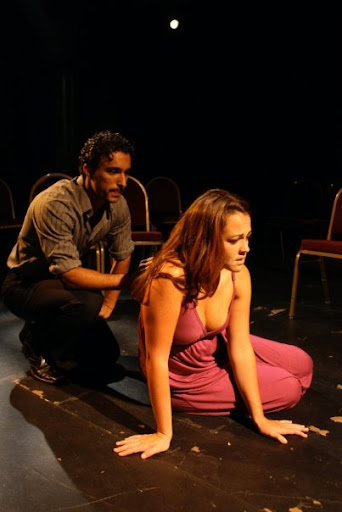1. What did you do in 2009 that you'd never done before?
Worked out every single day for several months.
2. Did you keep your new years' resolutions, and will you make more for next year?
I did. See above. And I will for next year too. I have a good feeling about 2010.
3. Did anyone close to you give birth?
My nephew, Cruz Antonio Thomas, turns one year old on December 13th. That is not really answering the question, but I felt it was worth noting. I have pregnant friends, but no more nephews or nieces yet!
4. Did anyone close to you die?
Yes.
My best friend from college took his own life in June. He was the love of my life. I don't know how else to put it. His death has really messed me up in a lot of ways.
I miss him like crazy.
5. What countries did you visit?
None.
6. What would you like to have in 2010 that you lacked in 2009?
A published article. Can somebody work that out for me? Thanks.
7. What dates from 2009 will remain etched upon your memory, and why?
Saying goodbye to all of the graduates from my class at FSU in May was a rough, rough time. Those four or five days were killer.

The best day of 2009 was probably August 10th. I was in New York, and Ryan and I took the subway from midtown to the upper west side and met Vanya, Dave, Joe, Gretchen, Maria, Rick, Julie, Herman, Jaime, Kate, Rob, and Becky for dinner and drinks. We had THE BEST time. And I was with people I miss like a piece of my heart. New York was completely magical this year. I stayed with Wahima and Becca, Elizabeth visited while I was there, I ran into Brian at a random diner in Queens, I was reunited with my ATHE queers, I got to visit with
Stinkylulu, I finally saw John again after 2 years, I went to the Stonewall Inn with Alison and Brent and Ryan and Liz and Cassidy, I saw a show and drank lots of beer with Julie. It was amazing.
I also spent a weekend in Seattle and a weekend in Lynchburg, Virginia this summer. Both were wonderful reunions with friends and fun road-trips.
8. What was your biggest achievement of the year?
Probably my production of Sarah Kane's
Crave.
9. What was your biggest failure?
Keeping in better touch with my dearest friends.
10. Did you suffer illness or injury?
Yes. I was completely depressed for the months of July, August, September, and October. It had probably been a long time coming. It has to do with my anxiety about my schooling and career, obviously, but I also think it had a lot to do with figuring out how to process Andy's death. I think I have moved out of that depression now, but I don't really have any idea how that happened.
11. What was the best thing you bought?
P90X.
12. Whose behavior merited celebration?
My roommates Mark and Meghan; I am probably being oversentimental but they are just wonderful and I love living with them.
13. Whose behavior made you appalled and depressed?
The voters in Maine and the New York State Senate. I continue to be uninterested in fighting for gay marriage rights (it's just so
bourgeois!), but whenever someone actually votes
against gay marriage I get really pissed off. I continue to be baffled, interested, and confused by homophobia.
14. Where did most of your money go?
Books. And I am happy about that.
15. What did you get really, really, really excited about?
Crave. P90X. Dada (again).
16. What song will always remind you of 2009?
Iron & Wine's "The Trapeze Swinger." I also listened endlessly to Nico Muhly's score for
The Reader, and Philip Glass's
The Concerto Project. The obvious (and gay) answer to this question, however, is Whitney Houston's "Million Dollar Bill."
17. Compared to this time last year, are you:
a) happier or sadder? Happier
b) thinner or fatter? Thinner
c) richer or poorer? Poorer, but two out of three ain't bad. Especially considering
last year.
18. What do you wish you'd done more of?
Watching movies. Traveling. Reading interesting theory.
19. What do you wish you'd done less of?
Thinking about my work for Kris Salata. Reading theory about which I do not care.
20. How will you be spending Christmas?
With my family in their new giant house in Monrovia CA, with my friends at Anna's new condo in Corona CA, with my friends at Linda and Matt's house in Culver City CA, and with my friends at Ashley and Danny's house in Echo Park CA.
21. Did you fall in love in 2009?
No way, man.
22. How many one-night stands?
Depending on the definition of the term, 2 or 3.
23. What was your favorite TV program?
The Wire. No question.
24. Do you hate anyone now that you didn't hate this time last year?
Oh yes. But I get new students every year, and inevitably one of them pisses me off to a point beyond redemption.
25. What was the best book you read?
I have a bunch for this year:
Lee Edelman:
No Future
Lauren Berlant:
The Female Complaint
David Savran:
Taking It Like a Man
Pat Califia:
Public Sex
26. What was your greatest musical discovery?
Is it weird that I don't really follow music at all? I guess I listened to a lot of Teddy Thompson this year. I am tentatively revisiting country music.
27. What was the best piece of theatre you saw?
A
brilliant production of Pericles entitled
Pericles Redux directed by John Farmanesh Bocca.
A genius reworking of ALW and Time Rice's
Jesus Christ Superstar by Louis St. Louis and Darryl Jovan Williams entitled
Jesus Christ Superstar GOSPEL, which played at the
Alliance in Atlanta.
Also my friend Ryan did an adaptation/reimagining of
Lear that I almost didn't have words for because it was so fucking good. (I found words, obviously, after a bit. But there was a while there where I could only just stare at people with my mouth open.)
28. What did you want and get?
A trip to Atlanta to see Kate and a trip to Virginia to see Michael and Natalie.
29. What did you want and not get?
A new car. Can someone get me one, please?
30. What was your favorite film of this year?
The year is far from over, but so far it is Kathryn Bigelow's
The Hurt Locker. Have you seen it yet?
31. What did you do on your birthday, and how old were you?
Most everyone was out of town for Spring Break, but Liz and Ryan took me to
Clusters & Hops and made sure that a whole bunch of my friends were there, and it was really fun. I also made my own birthday cake (always a good idea.) I turned 28.
32. What one thing would have made your year immeasurably more satisfying?
Having more free time to spend with Jaime and John at their wedding.
33. How would you describe your personal fashion concept in 2009?
The only criterion for choosing a shirt is: Does it show off my new biceps?
34. What kept you sane?
Um, I didn't stay sane, so this question is not really applicable. But thank the Jesus for
Pot Psychology. And David, Catie, John, Anthony, Ruth, Lane, and Andrés this summer.
35. Which celebrity/public figure did you fancy the most?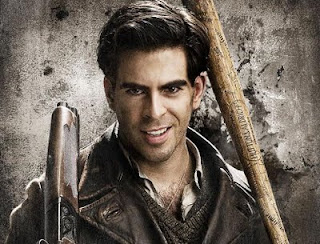 Eli Roth
Eli Roth. He is hot.
36. What political issue stirred you the most?
Sonia Sotomayor's confirmation hearings.
37. Who did you miss?
Michael Fatica.
Michael Stablein. Catie. Kate. Linda. Elizabeth. Ashley. Justin. Wahima. Danny. Rebecca. Jill. Jaime. Derek. Sarah. Anna. John. Joe. Julie. Ryan.
Carrie Sandahl. Christina & Isaac. Greg.
38. Who was the best new person you met?
Courtney Ward and Jeff Paden.
39. Tell us a valuable life lesson you learned in 2009:
Hope doesn't always fulfill its promises; the future rarely falls out the way I see it in my head. But it doesn't matter, really. We must always choose hope. There is no point in living without it.











